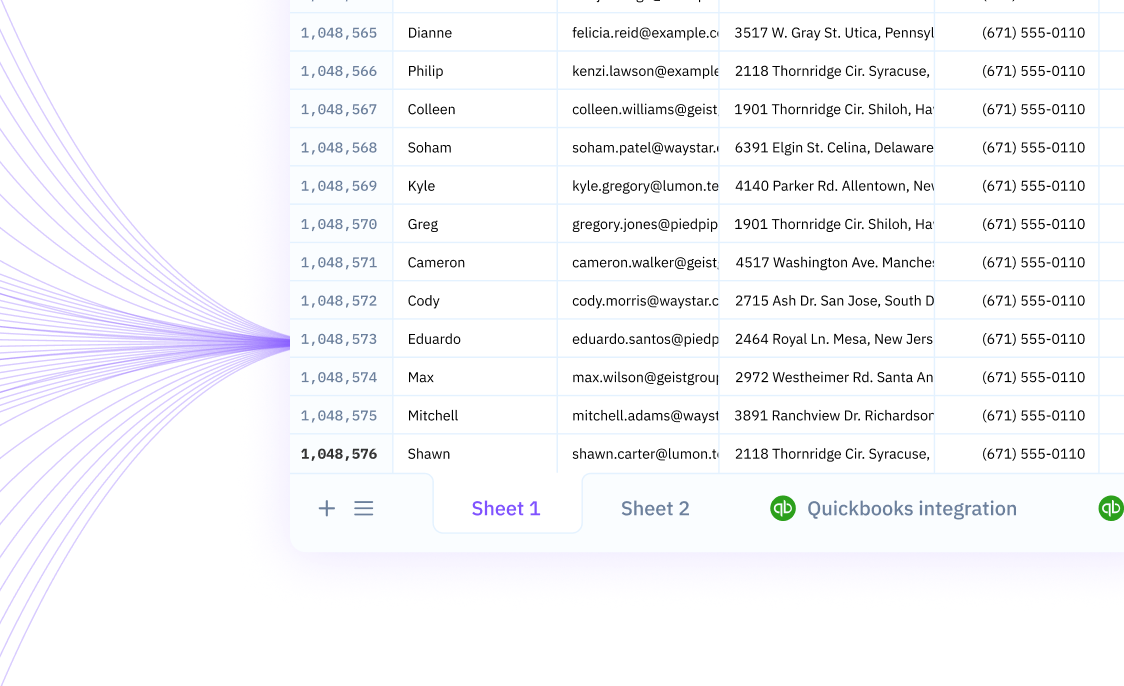
Export AWS EC2 list to CSV

Overview
In the dynamic world of cloud computing, managing Amazon Web Services (AWS) Elastic Compute Cloud (EC2) instances can be a complex task. Exporting AWS EC2 lists to CSV files emerges as a powerful technique to simplify this challenge, offering a structured and easily reviewable format that is particularly beneficial when loaded into spreadsheets for further analysis. On this page, we'll delve into the essence of AWS EC2 lists, demonstrate the streamlined process of exporting these lists to CSV files through a Python script, and explore practical use cases such as enhancing the efficiency of security teams in updating software on flagged instances. Additionally, we'll introduce Sourcetable as an alternative tool for CSV exports of EC2 instance tags and provide a helpful Q&A section to address common inquiries about exporting AWS EC2 lists to CSV.
What is AWS EC2 List?
AWS EC2 list refers to a set of commands within the AWS CLI that are used to retrieve information about Amazon EC2 instances. It allows users to display a comprehensive list of all their EC2 instances within their AWS environment. This functionality is crucial for managing and maintaining the instances that are currently operational.
The primary command used for listing instances is aws ec2 describe-instances. This command can be enhanced with the --filters option, which enables users to narrow down the results to only show instances that meet specific criteria, such as image ID, instance ID, or tag name. Additionally, the --query option can be employed to extract particular pieces of data from the listed instances, such as the InstanceIds.
Exporting AWS EC2 Instance List to a CSV File
Using the Example Python Script from GitHub
To export an EC2 list to a CSV file, you can utilize the example Python script available in the GitHub repository named search-ec2-instances-export-tags. This script allows you to search for Amazon EC2 instances using attributes such as Instance IDs, Private IPv4 addresses, and Public IPv4 addresses. Once the desired instances are identified, the script can export the associated tags for these instances into a CSV file. This facilitates quick review and categorization of EC2 instances based on their tags.
Limitations of the Example Python Script
It's important to note that the provided script is an example and is limited to searching by only the specified attributes: Instance IDs, Private IPv4 addresses, and Public IPv4 addresses. These are the only search parameters supported by the script, which means that instances cannot be searched using other potential attributes not listed.
Setting Up the Environment
Before running the example Python script, you should set up an isolated Python environment using virtualenv. This will ensure that any dependencies required by the script do not interfere with your system's Python environment. Additionally, you will need to have the AWS Command Line Interface installed to interact with AWS services and execute commands that the script relies on.
Import AWS EC2 List Directly into Sourcetable
Utilizing Sourcetable to import your AWS EC2 list presents a seamless approach to data management, bypassing the traditional export to CSV and manual import to spreadsheet programs. Sourcetable's capability to sync live data from a wide range of apps or databases, including AWS, streamlines the data integration process. This direct importation not only saves time but also mitigates the risk of data transfer errors that can occur during the CSV export-import cycle.
With Sourcetable, you benefit from an automated data pull that ensures your spreadsheet always reflects the most current information from your AWS EC2 instances. This feature is invaluable for businesses focused on real-time analytics and business intelligence. Moreover, Sourcetable's user-friendly spreadsheet interface allows you to query and manipulate your AWS data with ease, offering a significant advantage for both automation and strategic decision-making.
Common Use Cases
-
Inventory ManagementA
-
Compliance AuditingA
-
Cost AnalysisA
-
Resource TrackingA
-
Data Backup and Recovery PlanningA
Frequently Asked Questions
How do I export tags for a list of Amazon EC2 instances to a CSV file?
Use the example Python script provided in the GitHub search-ec2-instances-export-tags repository.
Can the example Python script help me review and categorize EC2 instances more efficiently?
Yes, it reduces the time needed to review and categorize EC2 instances by specific tags.
What attributes can the Python script use to search Amazon EC2 instances?
The Python script can search EC2 instances by Instance IDs, Private IPv4 addresses, and Public IPv4 addresses.
What should the input file contain for the Python script to export EC2 tags to a CSV?
The input file must contain a list of EC2 instances to search and export tags for, with each instance listed on its own line.
What will be the format of the output file when using the Python script to export EC2 tags?
The output file will be a CSV file containing the tags for the EC2 instances searched.
Conclusion
The provided Python script is a valuable tool for AWS EC2 users looking to streamline the process of exporting instance tags to a CSV file. By enabling searches based on Instance IDs, Private IPv4 addresses, and Public IPv4 addresses, the script significantly cuts down the time required to review and categorize instances, particularly those marked for updates or flagged by security teams. The entire process is made user-friendly by cloning the repository, setting up the environment, and executing the script with an input file, yielding a neatly organized CSV output. For those seeking an even more efficient solution, consider bypassing the CSV export altogether by using Sourcetable, which allows you to import data directly into a spreadsheet, enhancing productivity and data management. Sign up for Sourcetable today to streamline your AWS data management tasks.


